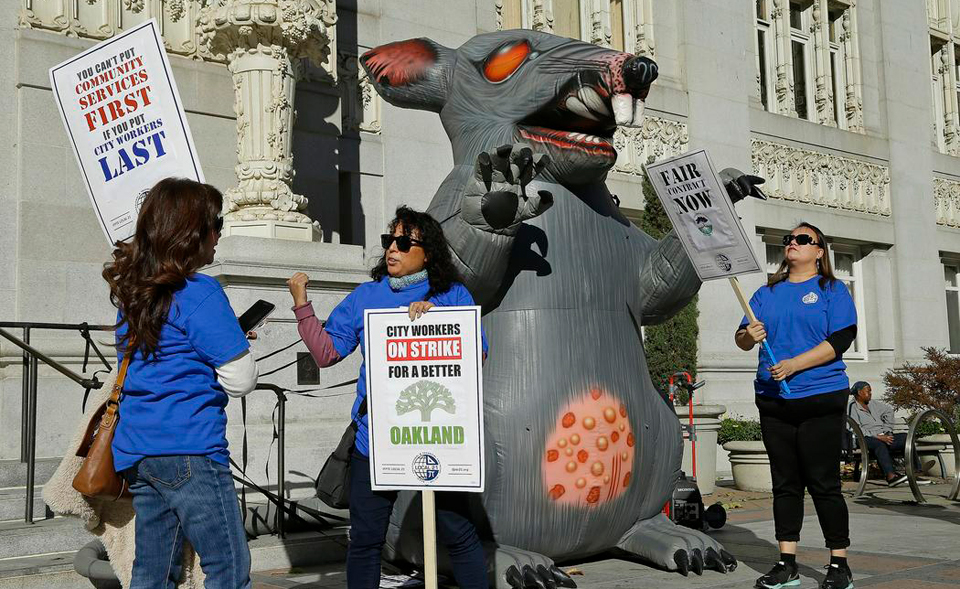
WASHINGTON—Just about the only worker protection the Trump-named GOP National Labor Relations Board majority hasn’t successfully banned, yet, is Scabby the Rat.
It’s not for lack of trying. NLRB General Counsel Peter Robb, its top enforcement officer, wants to trap and kill Scabby too, the Economic Policy Institute reports. A federal judge in New York state stopped him.
But Scabby’s fate is just a symbol.
In a comprehensive study of NLRB actions during the GOP Trump government, the pro-worker think tank reports that, as might be expected, the three-member NLRB GOP majority is dismantling worker protections wholesale, working from – among other sources – a U.S. Chamber of Commerce wish list.
While individual anti-worker decisions of the Trump-named board majority have occasionally made headlines, the overall trend has not, until EPI pulled it all together.
And it makes the point that unlike past GOP-run boards this one wants to make the changes permanent, by enshrining them as federal rules with the force of law.
“Donald Trump ran for president promising to uplift workers. But his actions have done the exact opposite,” EPI authors Celine McNicholas – EPI’s chief counsel – Lynne Rhinehart and Margaret Poydock. Rhinehart is the AFL-CIO’s former co-general counsel.
“And they’re not done yet,” the three warn. “The NLRB plans to go after more worker protections in the months ahead.” Including, again, Scabby the Rat.
Taken together with the prior decades of all-out employer war on unions, the NLRB’s concerted campaign could not only further weaken union strength in the U.S. – a top goal of the Chamber of Commerce, big business and the radical right – but could also further widen the income and wealth gap between the rich and the rest of us, EPI says.
Income inequality hit a high in the depths of the Great Recession, EPI reported. In 1932, when only one of every nine workers was unionized, the top 10% of the country garnered 46.3% of U.S. income. Union density rose to one-third of private-sector workers in the mid-1950s and actually was higher than the top 10%’s income share.
But ever since then, union density has been on a slide, especially after 1981, and the top 10%’s share starting rising just a year or two later. In 2017, the last year in EPI’s 100-year chart, 10.7% of workers were unionized – and the top 10%’s income share set a new record, its fourth in the last six years, of 47.9%.
That’s no coincidence, EPI’s study says.
“Since the 1970s, declining unionization has fueled rising inequality and stalled economic progress for the American middle class,” the study authors explain. But the Trump majority has taken a case-by-case dismantling of workers’ rights and converted it into wholesale systematic destruction.
“Under the Trump administration, the National Labor Relations Board has systematically rolled back workers’ rights to form unions and engage in collective bargaining with their employers, to the detriment of workers, their communities, and the economy.”
The NLRB’s actions under Trump were forecast in a memo from General Counsel Robb, who first came to the attention of right-wing and business circles in 1981.
That’s when, as a young Justice Department staffer in the Office of Legal Counsel, Robb crafted the memo GOP President Ronald Reagan used to fire the nation’s 14,000 unionized air traffic controllers, who were forced to strike for safety reasons.
Corporate chieftains took those firings as a license to go after workers and unions, wholesale, and have done so ever since. What’s-his-name’s memo set as the NLRB’s objective undoing every single pro-worker protection the board approved during the Democratic Obama administration.
EPI’s report, though, shows the board’s GOP majority has gone beyond that.
That’s because, unlike prior GOP-run boards, this Trump majority is taking the extra step of scheming to make the teardowns permanent, by writing them as federal rules with the force of law. That makes the elimination of workers’ rights tough to undo.
Its latest use of that power, which past NLRBs rarely invoked, came Oct. 24, when the GOP board majority proposed a federal rule permanently banning private university research assistants and teaching assistants from unionizing (see story last week).
Not only that, but both funding and staffing at the board, which rules on worker-boss relations in every part of the private sector save for airlines, railroads, and their allied businesses, have declined drastically under Trump.
The board’s budget has stayed flat, in regular dollars, for almost two decades. In real dollars, adjusted for inflation, it’s declined. It was $251 million in fiscal 2008, the last full year of the GOP George W. Bush administration. Trump’s proposed $241 million for fiscal 2020 began Oct. 1.
The agency’s budget peaked at $283 million in fiscal 2010, during the Democratic Obama administration. In regular dollar terms, it’s down 15% from the peak. In real dollar terms, adjusted for inflation, it’s down even more. And the board now has 1,280 full-time employees, or one for every 96,000 workers it covers. That’s down 10% in just two years, and EPI calls that “hollowing out the agency from within.”
But even worse than the cuts in budget and staff are the systematic cuts in worker rights the Trump-named board majority and Robb imposed or are working on. They include:
Further restricting union opportunities to communicate with workers. Past NLRB rulings said union reps could talk with workers in non-work areas, such as parking lots and break rooms. The Trump majority, in three rulings, banned the reps from those areas, too. Charities can campaign in the company parking lot; union reps can’t.
The board, in a case involving the News Guild and the Eugene (Ore.) Register-Guard, also said that if the boss lets charities, or anyone else, use its internal e-mail systems to communicate with workers, it must let unions use it, too. The Trump majority called for legal briefs on a proposed rule, which would have the force of law if adopted, restoring that discrimination against workers and unions.
Letting bosses determine who can unionize. In the 2011 Specialty Healthcare case, the then-Democratic board majority said unions could organize in “an appropriate unit” for collective bargaining, if the workers in the unit “shared a community of interest.” That decision led congressional Republicans to scream – and try unsuccessfully to ban – what they called “micro-unions.”
The board majority enacted the ban on micro-unions in 2017, EPI reported. That lets bosses resume challenging bargaining units or expanding them to include anti-union workers. It also ties proposed elections up in legal knots.
Making it easier for anti-union workers to throw out the union and harder for a thrown-out union to get back in. Bosses and/or their union-busters often prompt dissenters to start such “decertification” campaigns and give them under-the-table support, though EPI did not say so.
“The employer can’t legally do that (decertification) if the union proves it did in fact have majority support when the employer withdrew recognition. In the case Johnson Controls, the Trump board reversed this longstanding rule, allowing employers to unilaterally withdraw recognition of a union if they have evidence the union has lost majority support. If workers want to get their union back, they must file a petition for a new election — giving the employer time to deploy all its resources to defeat the union.”
Changing the contract – and getting away with it – without telling the union. “A collective bargaining agreement (CBA) is the contract the union and the employer negotiate, setting out the terms of pay and employment,” EPI explains. Both the bosses and the union – and the workers – are supposed to obey the contract. When one, almost always the boss, doesn’t, the other – the union or the workers – can legally grieve it. However, Trump NLRB decisions in the cases MV Transportation and Raytheon create loopholes allowing employers to change the terms of employment without bargaining with the union,” EPI reports.
The Trump majority is also using those two cases to expand “management rights” clauses in CBAs. Such clauses basically allow the bosses to claim the “right” to do whatever they want in the name of greater efficiency, profits, or both.
EPI reports Robb is urging the majority to vote for letting bosses unilaterally impose “discretionary discipline” on union workers without having to bargain over the issue in CBAs. When the union involved in that case, called Care One, asked to withdraw it early this year – hoping to bring the issue back in the future – the Trump majority refused. The case is pending.
Restoring bosses’ roadblocks to organizing drives and union recognition elections. In the 84-year-life of the National Labor Relations Act, bosses have used the courts, GOP majorities on the board, and legislation to throw tons of roadblocks in the way of union organizing. The roadblocks range from challenging who can vote in the election, beforehand, to throwing up bogus claims about union election interference.
And the GOP-passed laws also legalize some of the roadblocks, notably a ban on negotiated dues collections in so-called right-to-work states and mandatory anti-union “captive audience” meetings, run by bosses, union-busters or both.
The Obama-named Democratic board majority removed some of those blockades, notably those, such as challenging who can vote, that delayed or denied union recognition elections for months or years. The Trump-named NLRB majority published a new federal rule, which if adopted would have the force of law, restoring the roadblocks. That aim, like many of the others the Trump majority is undertaking, is on the Chamber of Commerce’s wish list.
Restoring the ability of “joint employers” – think McDonald’s and its local franchises – to duck responsibility for bargaining, or for labor law-breaking. The Obama board ruled in a decision involving Browning-Ferris Industries that corporate headquarters, which sets the rules for its franchises on everything from servers’ uniforms to salaries to soup spoons, is responsible for obeying or breaking labor law, too. Trump’s board majority overturned that, but then its decision was toppled by a conflict of interest involving GOP board member William Emanuel. Now, EPI says, it’s trying again.
Force workers to take grievances to “impartial” arbitration. Studies show arbitrators rule for bosses and against workers at least 90% of the time. The GOP-named 5-man majority on the Supreme Court laid the groundwork for this move in a case called Epic Systems where it ruled federal law’s preference for arbitration trumps grievance procedures of a collective bargaining agreement. Since then, the NLRB has been tossing out grievances left and right, saying arbitration rules instead.
EPI reports NLRB General Counsel Robb “would go further and say group litigation” – in plain language, class action suits – “over workplace violations is not protected activity under” labor law. Robb wants “the board to change the (arbitration) rules in the way the chamber seeks,” EPI adds.
Fire a worker for cussing out the boss, regardless of circumstances. Right now, if a worker insults the boss – or worse – due to the boss’s actions against the worker within or without an organizing drive, the boss can’t legally fire the worker. Labor law even protects “racially or sexually profane language” if the worker uses it to characterize the reasons for the boss’s actions.
The Trump board majority has called for briefs, on a rule that again would have the force of law, to let the boss always fire the worker for profanity or other language, regardless of what the boss did to prompt it or break labor law’s workers’ rights.
Let bosses keep their investigations of workplace complaints secret and bar workers from talking about them.
“The Trump General Counsel has asked the NLRB to change the law and allow employers to gag employees about employer investigations in a case called Unique Third Store. He signaled he wants to overturn precedent requiring employers to turn over witness statements from internal investigations,” in an internal memo in a case last year entitled American Medical Response West. Trump-named NLRB “Chairman John Ring has indicated he agrees.”
“The manner and speed with which the Trump board has reversed precedent lays bare their anti-worker, anti-union agenda,” the EPI’s authors conclude. “Congress must hold the Trump NLRB accountable and prioritize legislative reform that will restore the original promise of our nation’s labor law—to encourage and promote the practice of collective bargaining by working people.”












Comments